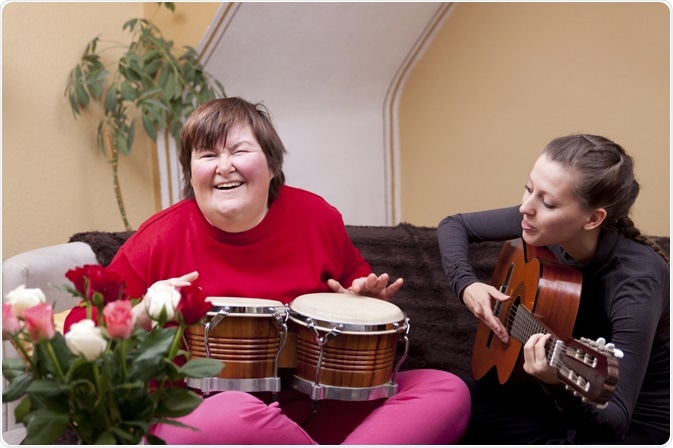
Image Credit: Miriam Doerr Martin Frommherz / Shutterstock.com
History
The concept of using music as a tool for healing purposes is an ancient concept. In fact, this practice can be traced back to the written works of Plato and his student, Aristotle.
This form of music therapy emerged as a formal profession after World War I and World War II when the influence of community musicians at hospitals was realized as a positive influence for veterans suffering from both physical and emotional trauma.
What is music therapy?
In this medical practice, the therapeutic use of music is used to address the numerous needs of individuals ranging from psychological, physical, and cognitive problems. This form of therapy is best when it is tailored to an individual’s requirements, during which the qualified music therapist provides the decided treatment that can include composing, singing, moving to, and/or listening to music.
A great benefit of music therapy is the ability to use it to address a great spectrum of needs. Moreover, the diverse nature of music can allow a person of any cultural background to benefit from this therapeutic approach. Music therapy can also offer a more engaging and interesting form of interaction with people, which could account for the growing interest in the field.
The Impact of Music Therapy
Applications
Research in music therapy is in support of its use in many areas. For communication purposes, for example, individuals who have just had a stroke find that their fluency and production of speech can be improved by singing to simple melodies. Comparatively, as a physical rehabilitation tool, those with poor motor coordination benefit from playing simple tunes on instruments.
Individuals diagnosed with impaired social skills, particularly autism spectrum disorders, can strengthen their ability to both express their own emotions and empathize by considering the feelings of the artist of a song. It has been shown that such people actually exhibit a great interest in music and therefore respond positively.
Substance abuse
The creativity of music therapy can assist clients in exploring their feelings and self-esteem issues. By forming personal attachment and associations between the individual and music, it becomes possible to educate about substance abuse and steer the individual towards developing skills in forming relations, self-expression, creative thinking, and effective communication instead of isolation and denial.
Stress and anxiety management
Individuals can be guided into learning how to recognize feelings and behaviors associated with stress. Music therapy can be used to induce relaxation stimuli so that stress is dealt with in positive and appropriate ways.
Palliative care
Music therapy can help alleviate fear and anxiety whilst encouraging relaxation to help those suffering from insomnia. The therapy can also provide an outlet for non-threatening self-expression by inducing a feeling of safety and comfort for the person.
Music therapy interventions can be categorized as active or receptive; however, a combination of the two is most common in an effective therapy session. These sessions can either be conducted with a group or individually, depending on the needs of each person.
Active music therapy will involve the patient actively a person is making music by singing, playing instruments, or composing music. Comparatively, receptive music therapy is when a person listens to or responds to music in approaches that include dance or the analysis of lyrics.
References:
Further Reading
Last Updated: Jul 1, 2023